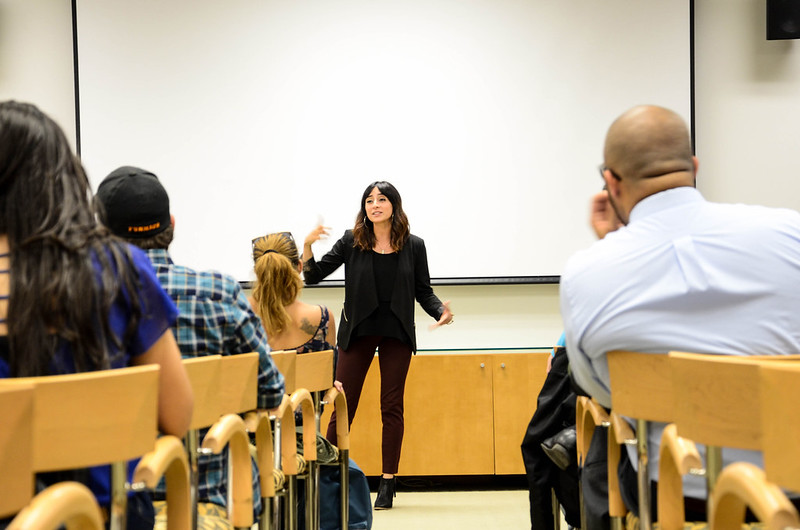Alumna Sarina Morales traded her baseball bat for ESPN
October 7, 2016
She was the only girl on her baseball team. Her dream — to play centerfield for the New York Yankees.
As she gets up to bat in front of a huge crowd of people in the Bronx, most of whom have come to scope her out to see if she can really play, the opposing team sits down on the field. The opposing team didn’t believe in her, and her own team didn’t cheer her on either.

The pitcher threw her a soft toss, she took it, and she didn’t quit. She went home, cried and grew a thick skin.
Sarina Morales didn’t quit.
Years later, Morales is now an on-air contributor for SportsCenter:AM, which is ESPN’s 7 a.m. ET edition of SportsCenter. On Thursday, she spoke to students at Syracuse University as the commemorative speaker for Latino/Hispanic Heritage Month on race, gender and sports.
“My greatest memories were growing up in the Bronx, [and being] supported,” said Morales.
She recalls growing up in a lower middle class family, where resources were scarce, but the support of those around her was great. Growing up, her family of four shared a one-bedroom apartment, where her parents slept on the sofa in the living room and they used food stamps; but this was where the Newhouse alumna felt best because she was most supported by those around her in whatever she wanted to accomplish.
Now, living in a world where Latinos, minorities and women aren’t given the same opportunities or support because of their skin color or gender, Morales believes that the majority — white males — needs to support the minority for there to be achievement and growth in the sports industry.
With having more of that support at ESPN, Morales wants to give the voice to minorities – Latinos, people of color, and women – who might not get the opportunity to have one.
“Being a Latina, you have two things against you,” she said. “You’re the minority, and you’re the minority again because you’re a woman. I try to look at things that are a disadvantage as an advantage. I’m a Latina, so I’m going to pitch the story on Laurie Hernandez.”
Morales interviewed and wrote a story on Olympic gymnast Laurie Hernandez for The Undefeated on how people don’t see her as Puerto Rican enough.
Though society might she her as not being Latina enough because of her fair complexion, that is something the Bronx native never considered herself – not Latina enough.
“I never felt I wasn’t Latina because I just so identify as [Latina],” said Morales. “I visit my family in Colombia; I grew up in the Bronx; I played baseball; I eat pasteles for the holidays. There are certain things that I do that are engrained in the culture. When I hear Spanish, it’s comforting to me. I’ve never not felt that.”
Latinos are judged on how Hispanic they are, she said. Judged on whether they speak Spanish, how well they speak Spanish; whether they were born in the U.S. or not; how well they represent Latino heritage; and whether they identify or not.
Morales believes you’re either born Latino or you’re not, but you are being judged on a score you were never really prepared for as a Latino, or a minority, by society. For her, she didn’t get any of her career opportunities without someone taking a chance on her.
After graduating from Newhouse in 2008, the same year as the recession, due to lack of job opportunities, Morales went to London where she traveled and worked as a production assistant. Upon returning to the U.S., a year later, her mentor told her that Nike was holding a national contest for a position as a field reporter. The former baseball player submitted her entry video, and won the contest. In her video, instead of telling Nike why they should hire her, she took a different approach.
“I said, ‘If you don’t hire me, I’m going to be selling Reeboks at Foot Locker.’”
After completing her year as a field reporter, Morales interviewed with ESPN, but it just wasn’t the right time.
In 2012, she became a digital marketing and integrated brand strategy coordinator for Turner Broadcasting. A year later, Morales left Turner for National Geographic where she oversaw their social media, specifically for National Geographic Wild. While there, Morales grew the National Geographic Wild account from about 300,000 followers on Facebook to 6 million followers within the year-and-a-half.
While doing video work for a National Geographic contest, the video caught eye on Rob King, who oversees SportsCenter, she said. She received an email to interview with ESPN again, four years later, this time securing the position as a contributor.
“I changed the way my dad thought about women in sports,” she said. “I was so good [at baseball]. He told me I was better than half the guys on the team.”
As a former athlete and a woman, Morales is an advocate for women in sports. She believes that the industry has to even out the playing field and allow women the opportunity to be in sports – reporting, public relations, or other areas – regardless of knowledge, or lack thereof. Although some women would like to enter the sports media industry, but fear they don’t have enough experience, she believes that their lack of experience could provide insight and be used as an advantage in media and storytelling.
“My dream was to work at ESPN: SportsCenter, and I got there eight years after graduation,” she said.
Instead of a Barbie doll, Morales’ dad handed her a baseball bat as a kid, and she hasn’t looked back since.
More by this author
Related tags
Popular tags on recent stories
By visiting this site, you agree to the Terms of Use
Produced by S.I. Newhouse School of Public Communications,
Syracuse University, 215 University Place, Syracuse, NY 13244







Post new comment